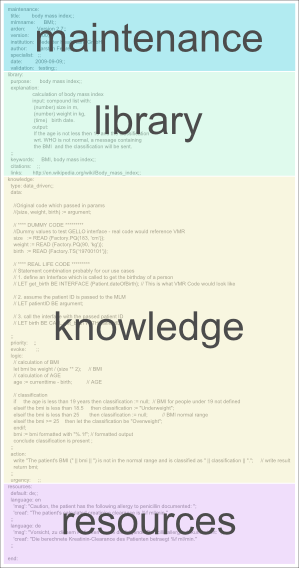Arden Syntax:Implementation Guide:Syntax Description
Contents
Fundamentals
Medical knowledge in Arden Syntax is arranged within Medical Logic Modules (MLMs) where each MLM represents sufficient knowledge to make a single decision. Each such an MLM is well organized and structured into categories and slots with specific content.
maintenance: title: ;; mlmname: ;; arden: ;; version: ;; institution: ;; author: ;; specialist: ;; date: ;; validation: ;; library: purpose: ;; explanation: ;; keywords: ;; citations: ;; links: ;; knowledge: type: ;; data: ;; priority: ;; evoke: ;; logic: ;; action: ;; urgency: ;; resources: default: ;; language: ;; end:
An MLM is composed of slots grouped into 4 required categories: maintenance, library, knowledge, and resources. A category starts with its name followed immediately by a colon (e.g., maintenance:) and the categories must appear in the correct order. Within each category is a set of slots which also must appear in the correct order.
The maintenance category contains information unrelated to the MLM’s health knowledge and is used for MLM knowledge base maintenance and change control. The library category provides health personnel with explanatory information as well as links to relevant health literature related to the MLM’s health knowledge. The resources category specifies localized textual resources that can be used within the knowledge category. The knowledge category actually defines the MLM’s action, data access, and logic.
An MLM is identified by using the following 3 pieces of information:
- Name
- Institution
- Version
Language Concepts
Data Types
Null, Boolean, Truth Value, Number, Time, Duration, String, List, Object and Fuzzy Sets
Primary time and applicability
